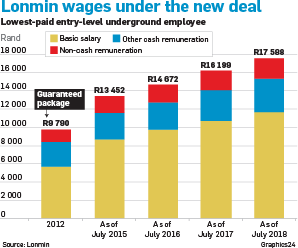
It was smiles and handshakes all round at the signing of the Association of Mineworkers and Construction Union (Amcu) wage deals with the major platinum mines this week.
The three-year deals are moderate by the sector’s standards and mark Amcu’s first wage round in the sector without a strike of historic proportions taking place.
Lonmin CEO Ben Magara joined Amcu’s leadership to announce the deals and was trading jokes with Amcu officials after the paperwork was done.
He even pumped his fist and shouted “Viva Lonmin!” once or twice.
Like the deal that ended the five-month platinum strike in 2014, it gives workers a relatively high basic wage increase – at the cost of their other benefits.
The deals with the three companies differ in relatively minor ways, but all feature the same core increase to the basic wage: R1 000 per year for three years.
This will raise the lowest basic wage for underground workers from R8 000 to R11 000 by July 2018 at Anglo/Sibanye and Impala.
At Lonmin, where wages are slightly higher due to a hasty deal following the Marikana massacre, the basic wage will rise from R8 700 to R11 700.
The housing allowance of between R2 000 and R2 500 will only increase by 5% or less every year.
After the Marikana massacre, the basic cash wage of an entry-level worker at Lonmin was 58% of remuneration.
By the end of the new deal in 2018, this will stand at 67% of total remuneration.
Amcu president Joseph Mathunjwa said the increases were “way above inflation”.
“I don’t think any union in South Africa can compare themselves to us,” he said at the media briefing.
In reality, however, the wage deal represents a relatively small premium over inflation if the low benefit increases and 7% increase for higher-level employees are factored in.
At Anglo American Platinum (Angloplat), the deal translated into a cost-to-company increase in the wage bill of, on average, 6.74% over the next three years, the company said.
This is barely above inflation.
Lonmin did not reveal the total cost-to-company effect, but for just the lower-paid bargaining units, the average effect is 7.4% a year – well within what is normal for wage increases before the events of 2012.
“For us, what matters is the total cost to company,” said Impala spokesperson Johan Theron.
Magara told City Press the cash-first structure of the wage deals was not all that big a departure.
Managers at Lonmin had long had the option of having their increases go to cash payments rather than retirement contributions, and this had now simply been extended to the whole workforce, he said.
“You cannot indefinitely continue moving remuneration into the basic wage,” he admitted.
In the long run, this would erode mine workers’ retirement savings relative to their wages, setting them up for a poor retirement.
A mining company official told City Press that the National Union of Mineworkers (NUM) had not received the credit it deserved for the massive gains in non-cash benefits it won for mine workers in the years before it was displaced by Amcu.
In pushing the NUM out of the sector, Amcu has also reversed this emphasis by pushing for more cash in hand.
The NUM pointed this out in a statement, saying that “the entire wage agreement is a big loss to poor mine workers, who are being made to believe they have achieved a lot”.
“The benefits are calculated from a lower base below their basic salaries, and that is where the problem is. Workers are highly ripped off in this agreement,” said the NUM.
It is, however, powerless to do much about it.
Both Lonmin and Impala now recognise no other unions but Amcu.
At Impala, the NUM now has about 3.5% of workers as members, according to Theron. At Lonmin, it was likewise below 5%, said Magara.
At Angloplat, the minority unions are recognised, but Amcu’s majority is large enough to let it unilaterally impose its wage deal on all workers in any case.
The deal with Anglo is also now Sibanye Gold’s baby as the sale of Anglo’s Rustenburg platinum mines gets finalised this week.
Mathunjwa suggested that Amcu was already on guard against any possible retrenchments at the Rustenburg mines once Sibanye takes the reins.
The deals with the three companies differ in relatively minor ways, but all feature the same core increase to the basic wage: R1 000 per year for three years.
This will raise the lowest basic wage for underground workers from R8 000 to R11 000 by July 2018 at Anglo/Sibanye and Impala.
At Lonmin, where wages are slightly higher due to a hasty deal following the Marikana massacre, the basic wage will rise from R8 700 to R11 700.
The housing allowance of between R2 000 and R2 500 will only increase by 5% or less every year.
Importantly, provident fund contributions will be calculated off a lower base than basic wages, rising by more or less inflation.




 Publications
Publications
 Partners
Partners









